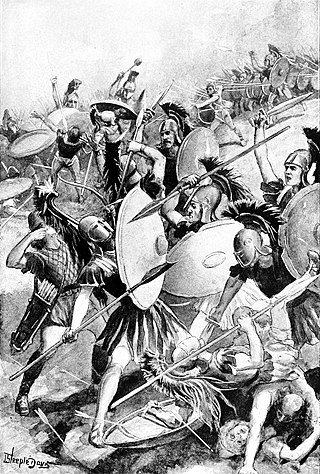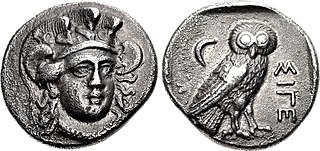Related Research Articles

Demosthenes was a Greek statesman and orator in ancient Athens. His orations constitute a significant expression of contemporary Athenian intellectual prowess and provide insight into the politics and culture of ancient Greece during the 4th century BC. Demosthenes learned rhetoric by studying the speeches of previous great orators. He delivered his first judicial speeches at the age of 20, in which he successfully argued that he should gain from his guardians what was left of his inheritance. For a time, Demosthenes made his living as a professional speechwriter (logographer) and a lawyer, writing speeches for use in private legal suits.
This article concerns the period 349 BC – 340 BC.

This article concerns the period 329 BC – 320 BC.

Phocion, nicknamed The Good (ὁ χρηστός, was an Athenian statesman and strategos, and the subject of one of Plutarch's Parallel Lives.

The Sicilian Expedition was an Athenian military expedition to Sicily, which took place from 415–413 BC during the Peloponnesian War between Athens on one side and Sparta, Syracuse and Corinth on the other. The expedition ended in a devastating defeat for the Athenian forces, severely impacting Athens.

Aeschines was a Greek statesman and one of the ten Attic orators.

Olynthus is an ancient city in present-day Chalcidice, Greece. It was built mostly on two flat-topped hills 30–40m in height, in a fertile plain at the head of the Gulf of Torone, near the neck of the peninsula of Pallene, about 2.5 kilometers from the sea, and about 60 stadia from Poteidaea.
Eubulus was a statesman of ancient Athens, who was very influential in Athenian politics during the period 355 BC to 342 BC and was notable for his abilities in managing Athenian finances.
Demades was an Athenian orator and demagogue.
Charidemus, of Oreus in Euboea, was an ancient Greek mercenary leader of the 4th century BC. He had a complicated relationship with Athens, sometimes aiding the city in its efforts to secure its interests in the northern Aegean, sometimes working against it. He was castigated by Demosthenes in his oration Against Aristocrates for repeated treacherous actions toward Athens, yet later he received Athenian citizenship and was elected one of its generals. In this capacity he ran afoul of Alexander III of Macedon and was ordered into banishment after the destruction of Thebes in 335 BC. He retired to Persia, where he was first honored by the Great King, but was later executed after sneering at the quality of the Persian army.

Chares of Athens was a 4th-century BC Athenian military commander (Strategos), who for a number of years was one of Athens's foremost commanders. He was also a well connected politician enabling him to procure the commands he desired, commands he primarily used to enrich himself and his adherents.
The "First Philippic" was delivered by the Athenian statesman and orator Demosthenes between 351 BC-350 BC. It constitutes the first speech of the prominent politician against Philip II of Macedon. A philippic refers to a type of speech that is negative in tone and one that is comparable to a rant or a tirade.
The "Second Philippic" is an oration that was delivered by the Athenian statesman and orator Demosthenes between 344–343 BC. The speech constitutes the second of the four philippics the orator is said to have delivered.
Peace of Philocrates is the name of the peace treaty concluded in 346 BC between Athens and Macedon under Philip II. Philocrates was the name of the main Athenian negotiator of the Treaty.
"On the Peace" is one of the most famous political orations of the prominent Athenian statesman and orator Demosthenes. It was delivered in 346 BC and constitutes a political intervention of Demosthenes in favor of the Peace of Philocrates.
"On the False Embassy" is the name of two famous judicial orations, both delivered in 343 BC by the prominent Athenian statesmen and fierce opponents, Demosthenes and Aeschines.
The Third Sacred War was fought between the forces of the Delphic Amphictyonic League, principally represented by Thebes, and latterly by Philip II of Macedon, and the Phocians. The war was caused by a large fine imposed in 357 BC on the Phocians by the Amphictyonic League, for the offense of cultivating sacred land; refusing to pay, the Phocians instead seized the Temple of Apollo in Delphi, and used the accumulated treasures to fund large mercenary armies. Thus, although the Phocians suffered several major defeats, they were able to continue the war for many years, until eventually all parties were nearing exhaustion. Philip II used the distraction of the other states to increase his power in northern Greece, in the process becoming ruler of Thessaly. In the end, Philip's growing power, and the exhaustion of the other states, allowed him to impose a peaceful settlement of the war, marking a major step in the rise of Macedon to pre-eminence in Ancient Greece.

Classical Greece was a period of around 200 years in Ancient Greece, marked by much of the eastern Aegean and northern regions of Greek culture gaining increased autonomy from the Persian Empire; the peak flourishing of democratic Athens; the First and Second Peloponnesian Wars; the Spartan and then Theban hegemonies; and the expansion of Macedonia under Philip II. Much of the early defining politics, artistic thought, scientific thought, theatre, literature and philosophy of Western civilization derives from this period of Greek history, which had a powerful influence on the later Roman Empire. Part of the broader era of classical antiquity, the classical Greek era ended after Philip II's unification of most of the Greek world against the common enemy of the Persian Empire, which was conquered within 13 years during the wars of Alexander the Great, Philip's son.
The Theorica, also called the Theoric Fund or Festival Fund, was the name for the fund of monies in ancient Athens expended on festivals, sacrifices, and public entertainments of various kinds. The fund was, in certain circumstances, also distributed among the people in the shape of largesses from the state.

Under the reign of Philip II, the ancient kingdom of Macedonia, initially at the periphery of classical Greek affairs, came to dominate Ancient Greece in the span of just 25 years, largely thanks to the character and policies of its king. In addition to utilising effective diplomacy and marriage alliances to achieve his political aims, Philip II was responsible for reforming the ancient Macedonian army into an effective fighting force. The Macedonian phalanx became the hallmark of the Macedonian army during his reign and the subsequent Hellenistic period. His army and engineers also made extensive use of siege engines. Chief among Philip's Thracian enemies was the ruler Kersebleptes, who may have coordinated a temporary alliance with Athens. In a series of campaigns stretching from 356 to 340 BC, Philip II managed to ultimately subjugate Kersebleptes as a tributary vassal, conquering much of Thrace in the process. Philip II also fought against the Illyrian king Bardylis, who threatened Macedonia proper, and against Grabos II and Pleuratus in Illyria. In his newly conquered territories, he founded new cities such as Philippi, Philippopolis, Herakleia Sintike, and Herakleia Lynkestis.